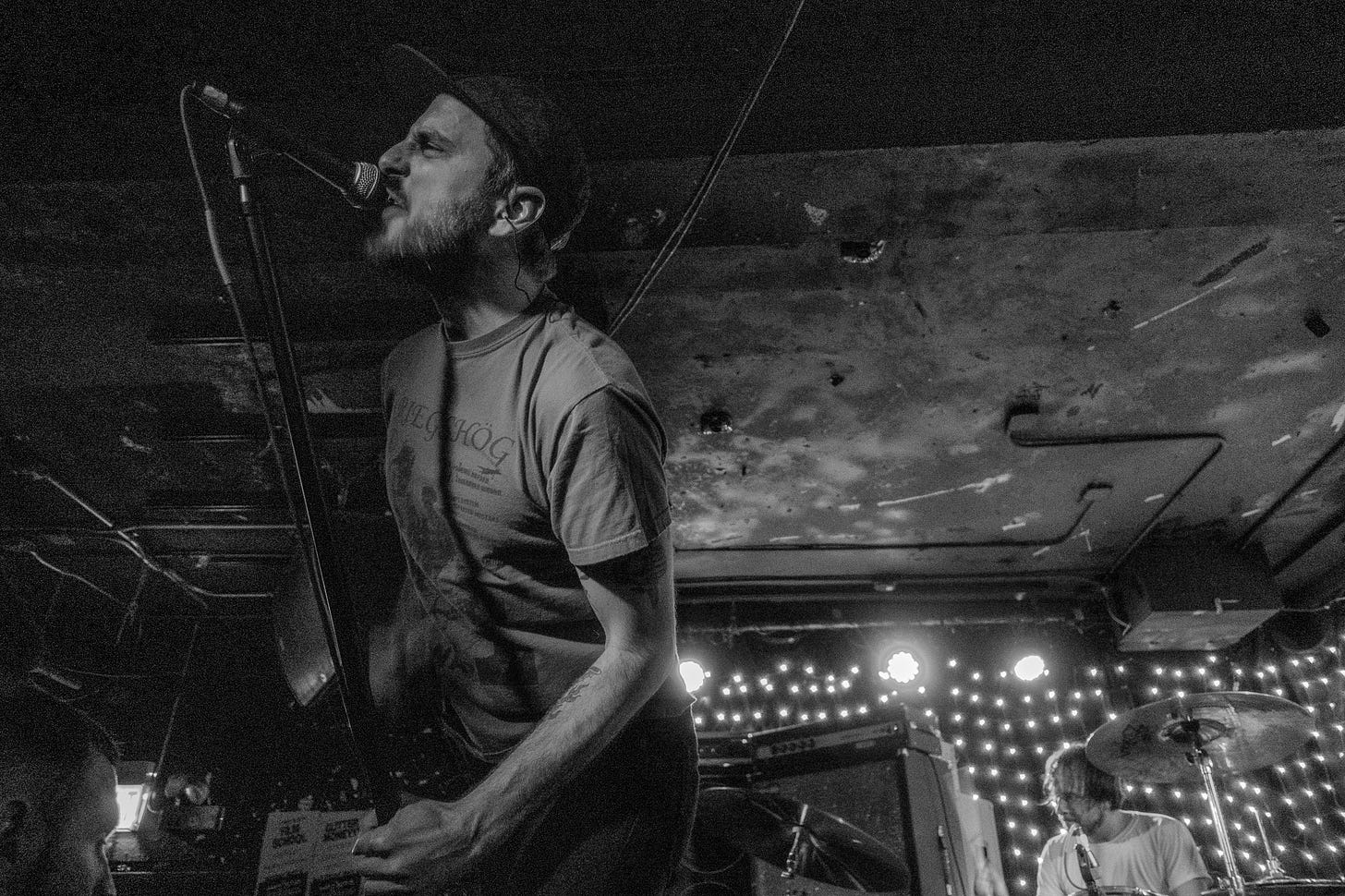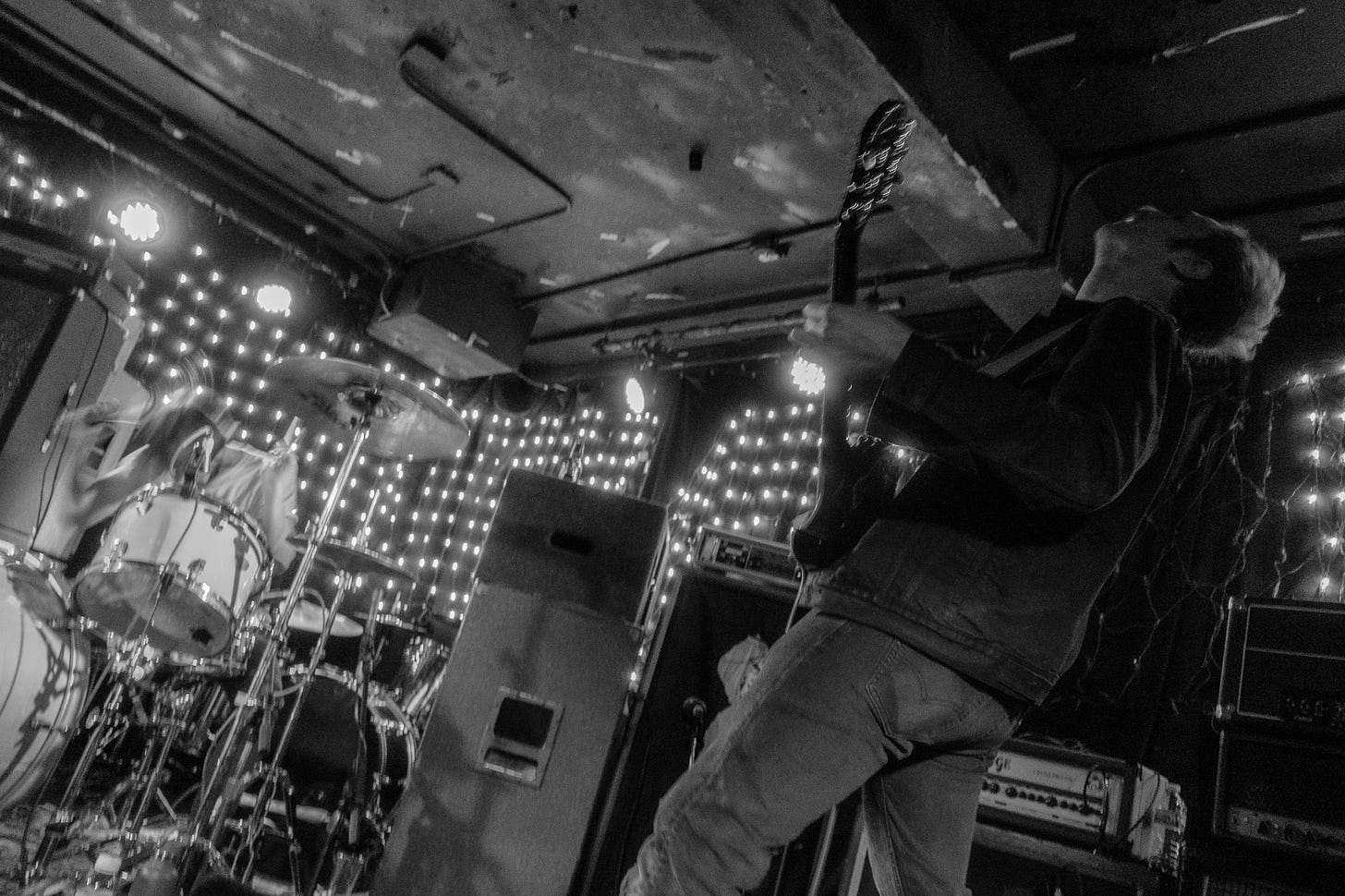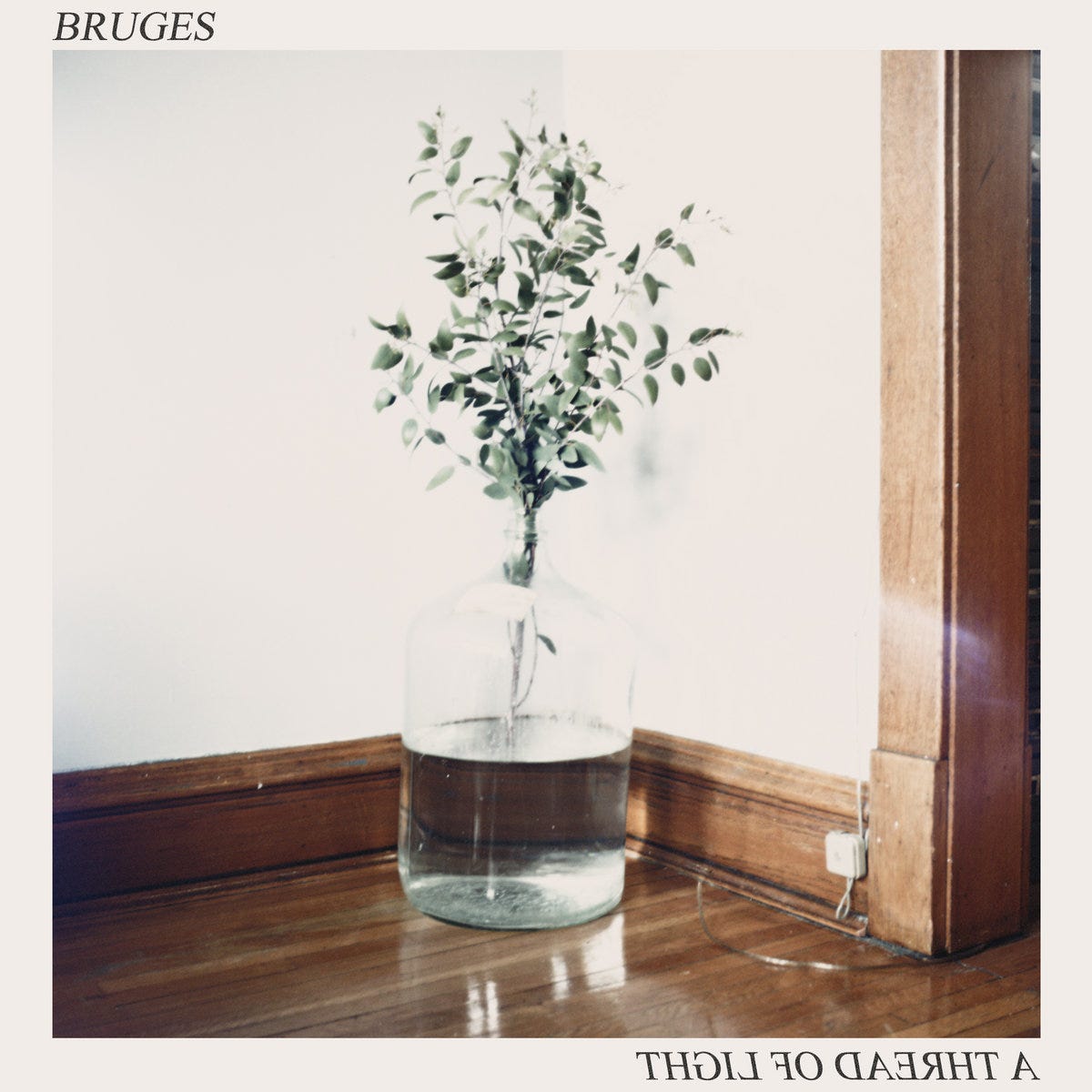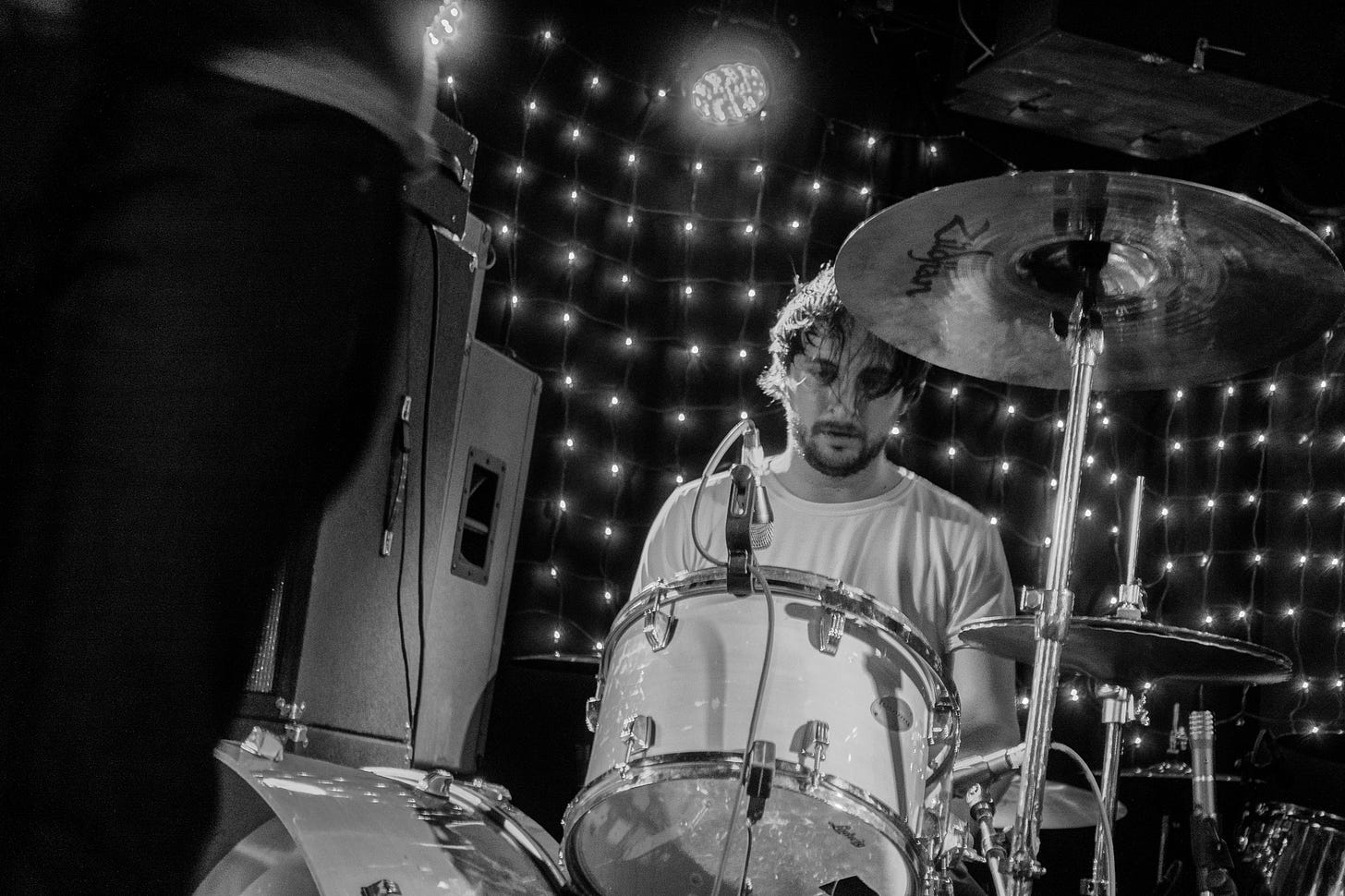
Bruges is one of my favorite bands in Chicago right now. Their new album, A Thread of Light, marries cacophonous guitar and a deliberately plodding rhythm section to vocals that don’t really scan as metal or punk, but will appeal to fans of both.
[Takes a sip] Intriguing. I taste notes of Shellac, Blut Aus Nord, Slint, and even a bit of Pygmalion-era Slowdive.
I sat down with Patrick Nordyke, Bruges’s singer and lyricist, to talk about his band’s outstanding new album.

Live photos by Ricardo Adame
First of all, congratulations on the new record. Did it come together quickly, slowly, amicably, following a great struggle–what? Walk me through it.
Well in terms of how it came to fruition, it took some time to get all the songs together and record. Most of the songs–or at least the basic ideas and structures–were milling around for some time. We knew that after our last EP, Erasure of Form, we wanted to continue our progression toward what some of those songs hinted at: music that isn’t necessarily obvious and builds tension in more subtle and natural ways. All told it probably took over two years to get the songs fully formed, regardless of how long they’d been kicking around as ideas. Easter egg: one song is one of our oldest and originally on our demo!
"The band find themselves harnessing the power of repetition to their advantage building a tension throughout the listen that rarely lets up.”
That's from the Thread of Light press release. Say more about the "power of repetition" and building tension. That might be what stands out to me the most here.
Wanting to use repetition as a musical device goes back to before we really even started writing music for the band, but the most recent record is where we learned how to harness it most effectively–rather than just ripping off the self-titled Godflesh record like when we first started. The song “Range of Light”–previously known as “( )” on our demo–was the first instance of us seeing how you could build tension through repetition in a song that may seem like it goes nowhere. The rhythm of the song is constant while the guitar and vocals build a world around it. It creates this swirling effect that can be disorienting or hypnotic. So on the latest record, the song “Translucent” does a very similar thing, but we’re learning to be more melodic with that approach rather than the “beat you over the head” heaviness that is on display on the song that comes immediately after, “Not Here.” Though the interplay of those two songs together is another way we wanted to highlight that tension.

I think the word "melodic" is apt. Obviously, you guys don't make pop music, but through repetition you create memorable and–dare I say–catchy sequences. "Are you wavering/are you wandering," for example, almost functions as a chorus, much like Godflesh's "breed/like rats." How did you decide which lyrics to repeat? Your lyric sheet reads like a poem. Do your lyrics begin as poetry?
Yea, I think the interplay of creating music that isn’t inherently catchy or even easily accessible and repeating lyrical passages is something that I’m interested in continuing to build upon. To elaborate on your last question in relation to this is the influence of Lungfish and Dan Higgs on me, personally, as a vocalist and musician. Lungfish never created easily accessible music, and Higgs’s lyrics were always very cerebral and mystical, but they create these eerie ear-worms that are hard to escape from.
Thank you for the compliment on the lyrics reading like poetry. I rarely receive feedback or criticism on my lyrical content so it is always nice to hear, especially considering I have been trying to get more into poetry which is maybe why that analogy shines through. I usually wait for a song to be fully formed before applying a set of lyrics to it. That not only helps me determine the mood of a song, but also the passages where lyrical devices like repetition can be used effectively. My lyrics tend to start as a couple of phrases that I turn to build upon the rest of the content. Is that how poetry works? Anyway, a good example of this is in the song “Passive Forms.” I had the phrase that the title of the record borrows from written down in my notebook. Once I knew I wanted that phrase to be a central piece of the song and knowing mostly what I wanted that song to be about, I built the rest of the lyrics around it with the music in mind.
I'm glad you mentioned Lungfish because I was going to ask you about specific vocal influences. Are there any other groups or records that really influenced your delivery? And while we're at it, you probably should talk about the group's musical influences, too.
I can’t go 5 minutes discussing influential music without mentioning Lungfish and Higgs. He’s very influential in all aspects of musicianship, delivery, and lyricism. You know, in terms of delivery I am having kind of a hard time figuring that out. The more singing delivery I use now was mostly discovered recording our last EP. I knew that our music was venturing toward territory that didn’t need me yelling. Who wants to listen to a man yell anymore anyway? I would say Evan Patterson’s vocals on the Jaye Jayle record “No Trail…” have had an influence on me. Patrick of Self Defense Family has always been an influence. A little known band from the UK called Hey Colossus has been inspirational, too, as that singer tends to shift between a more verbose, atonal sing-yell to a really great melodic voice.
As mentioned earlier, when we started Bruges it was a Godflesh rip-off band for sure. We even covered their song, “Jesu,” early on. It’s funny because I would say our progression in sound is akin to Broadrick’s stylistic transition from Godflesh to the more ethereal Jesu. Along with that, Dylan and Matty, who are the principal song writers, bring in so many influences from Noxagt to Portishead to My Disco to Shellac. The cross sections of music we sneak into this band is pretty wild, you can even hear Dylan’s love of black metal tremolo picking in a lot of the guitar passages that happen on the record.

Some of those bands (Shellac, Jesu) are old favorites, while others (My Disco, Jay Jayle) are completely new to me. Music! The gift that keeps on giving. But now let's talk about graphics, album art, packaging, etc.. I see that you did the Thread of Light art. Why did you choose to move away from the high contrast b&w images used on earlier recordings? Without interpreting the image for us, what are you trying to accomplish with the cover?
I originally had this idea about Bruges’s aesthetic wherein I would use the image that I digitally collaged for the demo, and for each release, continue to alter and distort it both physically and digitally. So the Erasure of Form EP was my first step in that process, and it also related to leaving the heavy, SUPER noisy sound behind–kind of erasing the old to build something new. With Thread, I started kicking around that idea, but I wasn’t wholly satisfied with anything I came up with, and I felt that the record needed something new to breathe some life into it. I had this image I had taken with an old medium format film camera around for years and had always wanted to use it for something. It spoke to me when I started drafting ideas for the artwork design. The original image is slightly out of focus so while it looks like a calm, peaceful image, it has always felt like there was something contrasting that beauty. That tension resonates within the music and lyrics, so after manipulating it even more I knew it was perfect for the cover. I also feel like I reference colors and imagery in my lyrics, too, which works thematically with the change from black and white to something that has more color.

To me, the cover image reflects your lyrical themes. I'm talking about ephemerality, absence, decomposition... all themes related to time. A houseplant can't live forever, glass eventually breaks, that good light for shooting film won't be good for long... Your best lyrical images serve these themes, too: the dirty red coffee cup, the burning candle, the cracked tiles.
Bruges's past work has an outdoor energy, but this album is very much an indoor record. It's all about domestic spaces, objects. That's very refreshing to me because often the best heavy atmospheric music seems to have an arbitrary fascination with nature. What I'm saying is just because the music's heavy doesn't mean it's got to be about mountains and glaciers and shit.
You know, it’s hard to be in an aggressive or heavy band and not fall into some of the tropes of bad lyric writing. I certainly have on very early Bruges efforts and early efforts from my other bands because I feel like it takes time to find your voice. I’m always influenced by the physical world around me and using things that I see to work out what’s going on inside my head. I think I really started to hone that craft on some of the songs off the Erasure EP and Angry Gods’ The Clearing, creating a visual world through lyrical themes. Sometimes I don’t know what it’s about and it takes time to figure out why I wrote something. For Thread… I wanted to write about interior space and the dissociating from it–which you picked up on. I needed to continue to take that visual element inwards towards hyper specificity of objects and spaces within those interiors. I was aiming to add to the layers of tension that were already naturally happening in the music by having lyrics that were about a space around you slowly fading, crumbling away.
Along with all of that, I would be remiss not to mention that there is another layer of repetition that I like to incorporate as an artistic device in lyrics through the constant use of words or phrases, from one song to another and even across releases. For instance, on this record I make a few different allusions to Erasure through a song title being lifted from prior lyrics and the reuse of a specific word. I feel the centerpiece of the record is “Passive Forms,” where the phrase “stagnant air” is a lyrical focal point directly related to the centerpiece song of Erasure, “Static Tone,” which ends with me repeating the phrase, “The air becomes stagnant.” I believe it’s an artistic device I’ve been subtle with and used to my advantage, but who really knows?!

People are always talking about attention spans in the 21st century and how Americans can't concentrate on anything for more than a minute. I've been reluctant to jump on that bandwagon. And here's Bruges with an album full of long, patient songs. Was that a conscious decision? Do you find yourself drawn to bands that operate in a similar mode? Or do you listen mostly to grindcore in your spare time?
I’ve heard that, too, and I think it becomes compounded when you have a media industry that focuses more on the next thing rather than letting a piece of art breathe and develop with a listener over time. We’re in the same reluctant boat! You know, after a show, a friend of the band once described our music as patient which really helped us develop an actual vocabulary for what we’ve been trying to achieve. I would definitely say it was a conscious decision and one that we’ve fully leaned into over time. We want to make music that is challenging for a listener, both translating from a recorded output to a live setting, as well. We intentionally create more of an experience rather than a set of songs. The movement of the record is contingent upon listening to it all the way through. The relation of one song to the next, coupled with the length of time it takes to get from one to the other. In a live setting, we really like to let the challenging nature of our songs shine through to the point where we are almost antagonistic. We’ll pick our longest songs to make a 3-song set. We play “Static Tone” from Erasure a lot because we really enjoy being able to stretch out the ending especially because it feels like a song that is almost anti-climactic. The same could be said of songs off of Thread, too, like “Range of Light,” “Not Here,” or “Layering.”
I find myself drawn to rhythm-based music, or at least music where the rhythm isn’t an afterthought. I will say that I pride myself on having a rather eclectic taste in music. I dislike music that is wholly technical because I feel you lose some of the emotional qualities of music in focusing so much on arpeggiated sweeps. Your guitarist can be a very talented player, but can they write a song that can really grasp someone and create an experience? I would argue that’s one of the many reasons I strongly loathe jam bands. But yes, in terms of bands similar to Bruges when the sound is done right it hits a sweet spot for me. Great examples would be True Widow, Big Brave, the latest Daughters record, and the Young Widows record, In and Out of Youth and Lightness.
You can come over and listen to the Dead with me sometime, Pat.
Okay, let's pivot for a second. This is a merch blog after all. Does Bruges have merch?
I will deny any offer to to relish in the Dead. You know, we are pretty lax on merch with this band. We have only printed long sleeves–designed by Chicago’s Bill Connors of Physical Medium and Dim. There are a handful left. We had tapes for the demo but haven’t done much outside of those two items. Realistically, a physical format seems undesirable these days so we have been apprehensive of putting more wax into the dollar bin. A label recently hit us up about releasing the record on vinyl. We’ll see how that plays out.
I’m out of questions. Anything you’d like to add?
You know, I don’t think so! Thank you Pat for talking!



